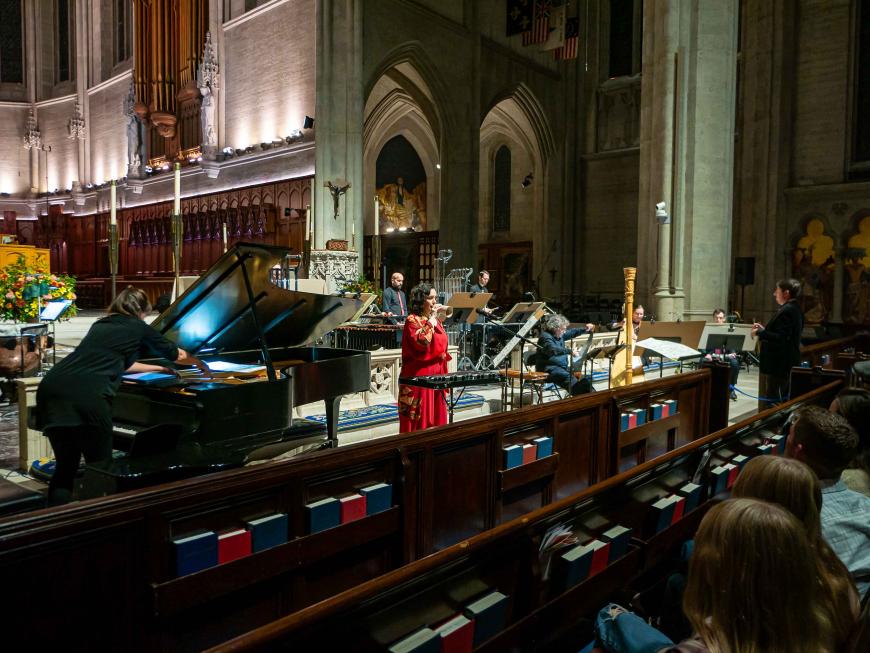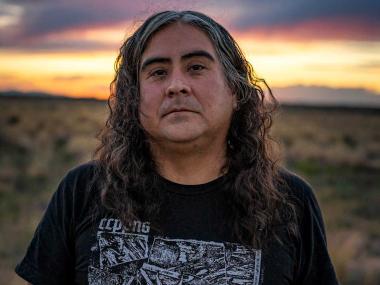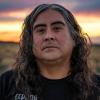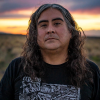
Grace Cathedral was an island of serenity and spiritual reflection more so than ever on Saturday, Nov. 11. With adjacent Huntington Park darkened and fenced in and the nearby Nob Hill hotels cordoned off by bunkers for the Asia-Pacific Economic Cooperation summit, a surprisingly good-sized crowd made its way past security guards for “RE:voicing,” a San Francisco Contemporary Music Players program that featured the Bay Area premiere of Raven Chacon’s Voiceless Mass.
That haunting work, at once spare and enveloping, shared the first half of the bill with compositions by the religious- and mystically-minded Olivier Messiaen and Chinary Ung, whose Luminous Spirals exuded a lyrically meditative calm. The concert was presented in collaboration with the California Festival.
Chacon’s Mass, winner of the 2022 Pulitzer Prize for Music, was the main attraction. The nature and use of space, as opposed to any liturgical program, lie at the heart of the composer’s enterprise. The piece “considers the futility of giving voice to the voiceless, when ceding space is never an option for those in power,” Chacon has said. The composer, who hails from Fort Defiance, Navajo Nation, is the first Native American to receive the music Pulitzer. He was at Grace for the performance, graciously acknowledging the audience’s warm response.

With 12 performers scattered around the cathedral and SFCMP Artistic Director Eric Dudley conducting from a mostly bare stage, the piece began with a low rumble from the organ (Christopher Keady) and double bass (Richard Worn). As the other strings entered softly from opposite side aisles, they conveyed a sense of light slowly dawning across a wide plain. With a pair of percussion players conversing in antiphonal fashion, the strings and woodwinds generated their own gently oscillating beats.
Mass developed in an organic way, patiently moving in rising waves and receding in gentle retreats. The flute (Jessie Nucho) and clarinets (Peter Josheff and Roman Fukshansky) traded phrases of yearning aspiration and gliding sighs. Widely spaced as they were, the musicians seemed to breathe together. Dudley conducted with sweeping wide-armed gestures that seemed to embody the embracing spirit of the work. At several points near the end, his palms met above his head in a prayerful pose.
All was not peaceful. Chimes rang out. The timpani signaled oncoming thunder. A rattling wind blew through. William Winant and Divesh Karamchandani were the poetically adroit percussionists.
But the prevailing mood was one of consolation, of things ascending, sometimes with great difficulty or uncertainty, and then converging. When it was through, one wondered how Chacon had achieved what he did. It was as if his Mass happened not in any grounded place but in the air, the towering sonic space of the cathedral shared by the musicians and listeners.
The evening opened with Messiaen’s Apparition de l’église éternelle for solo organ. Structurally simple and harmonically dense, this early work (the composer was 24) consists of a repeated battery of rising tonal cluster chords, with a tonic C-major climax in the middle, followed by a melodic and dynamic descent on the far side. Keady gave it his all, booming out the big chords with a sense of urgency. That said, the relatively brief running time of about 10 minutes was more than enough for the piece to register its forthright effect.

Ung’s trio Luminous Spirals charmed and beguiled from the start. When cellist Stephen Harrison sent a lovely singing melody aloft, flutist Jessie Nucho answered in kind. And so it went, with guitarist David Tanenbaum peacefully chittering between them, sending out his own curls of melody now and then in an evolving three-way conversation. Though it grew diffuse at times, these Spirals kept spinning out new material and colors, from a huffing flute to cello trills to a choice, beatific ending.
The second half of the evening was devoted to George Crumb’s vivid and theatrical Ancient Voices of Children. More than a half century after its 1970 premiere, this setting of Federico García Lorca poems retains its intoxicating allure. The work calls for a bravura performance by the lead singer. Soprano Tonia D’Amelio gave a dramatic, fully committed performance, whether she was singing into the piano’s strings to set off a whir of sympathetic vibrations, giving knife-keen energy to the text, or engaging in the score’s Spanish-flavored scat singing.
The demands of Crumb’s carefully etched rhythms and kaleidoscopic orchestration, which calls for a toy piano and assorted chimes and bells, among other things, were admirably met, for the most part, by the seven-member ensemble (plus Katie Pelletier’s treble voice).
The cathedral, which had figured so importantly in the first portion of the evening, was not the ideal setting here. The reverberant space blurred some of the precision and power of these Voices. It was a small sacrifice in an evening that was otherwise right where it needed to be.




